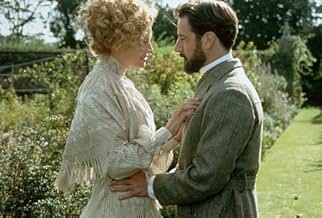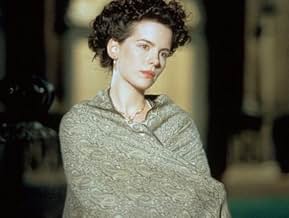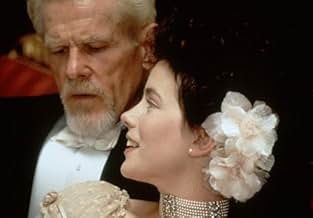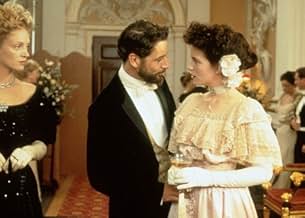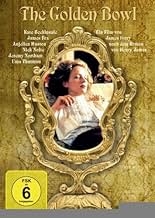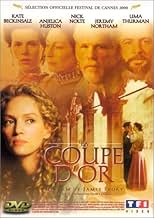ÉVALUATION IMDb
5,9/10
4,7 k
MA NOTE
Ajouter une intrigue dans votre langueA man marries an heiress for her money even though he is actually in love with her friend.A man marries an heiress for her money even though he is actually in love with her friend.A man marries an heiress for her money even though he is actually in love with her friend.
- Prix
- 1 victoire et 1 nomination au total
Histoire
Le saviez-vous
- AnecdotesAccording to costume designer John Bright, Cosprop provided lace and sequined dresses for the principal actresses: 28 outfits for Uma Thurman, 15 for Anjelica Huston and 20 for Kate Beckinsale.
- GaffesWhen the merchant delivers the golden bowl to Charlotte, he examines two pictures on the table behind the sofa. As he sets them down, the one on the right (seen from behind it) is placed so that it scrunches up the cloth runner. After Charlotte arrives, and he is explaining the coincidence of the subject couple asking about the bowl, the picture is seen again (from the front) and the cloth runner is smooth, as if recently ironed.
- Citations
Amerigo: What is it you want from me?
Maggie: I want a happiness without a hole in it! I want the bowl without the crack!
- Générique farfelugrateful thanks to Lord Tollemache and family; Frances, Duchess of Rutland; The Duke of Northumberland
- Bandes originalesMoonstruck
Words and Music by Lionel Monckton
Performed by Madeleine Potter (uncredited) and Robin Hart (uncredited)
Commentaire en vedette
I agree with Timer, and, frankly am tickled that someone else noticed the resemblance of the antique dealer Jarvis to Henry James himself. I have seen too many of James Ivory's films to feel that this was accidental. But I didn't really see the resemblance until Jarvis came to deliver the bowl. (His shop was rather dark, and he may not have been wearing his cut-away coat at work.) I also thought it interesting how at least twice Jarvis put his hands out to catch the bowl should someone drop it, thus calling our attention to its fragility. (This was crystal, not glass, and who knows whether it will break when dropped?)
The movie was over-long, of course. But it was a feast! There were many scenes that could have been edited down or eliminated, but the luxury of seeing the extra footage was wonderful. It reminded me of another favorite, wonderful(and long) movie, Mike Leigh's *Topsy-Turvey* (about the partnership of Gilbert and Sullivan).
And interestingly, there's the same continuity/accent problem in both. In *The Golden Bowl* Angelica Houston plays some scenes with a distinct American Southern accent and some without. In *Topsy Turvy*, Sullivan's lover is quite British in one scene, chatting on about young Winston, yet at a piano recital she speaks in an American Southern accent. Wouldn't you think someone would have noticed in both instances and just re-looped the audio?
Finally, the only reason I knew that Jarvis resembled Henry James is a book that my wife and I wrote for Harcourt. It's called *About the Author* and contains "juicy-bits profiles" of 125 favorite (living, dead, male, female, etc.) novelists. To put it another way, we assume that the reader has access to most of the boilerplate info on each author (Web searches, encyclopedia articles, textbooks, etc.). So we focus on the stuff you won't find in most of those sources.
As part of our research, we learned that James's novels were often inspired by conversations and stories he heard at the many dinner parties he attended in London. (Between 1878 and 1879, he dined out 140 times.) Shades of Truman Capote?
Although born in New York City in 1843, he became a British citizen in 1915. Henry James also attended Harvard Law School between 1862 and 1863. His father was a friend of Thoreau, Emerson, and Hawthorne. He himself, at age 26, arrived in London and soon met Darwin, George Eliot, Ruskin, Rossetti, William Morris, and others.
He felt that criticism was intellectually superior to creative writing and considered himself primarily a critic. At the time of his death in 1916 at age 72, his novels were all but unread. Only after the observance of his 100th birthday in 1943, when World War II had focused America's attention on Europe, did critics realize that he was one of the greatest novelists of the 19th century.
The movie was over-long, of course. But it was a feast! There were many scenes that could have been edited down or eliminated, but the luxury of seeing the extra footage was wonderful. It reminded me of another favorite, wonderful(and long) movie, Mike Leigh's *Topsy-Turvey* (about the partnership of Gilbert and Sullivan).
And interestingly, there's the same continuity/accent problem in both. In *The Golden Bowl* Angelica Houston plays some scenes with a distinct American Southern accent and some without. In *Topsy Turvy*, Sullivan's lover is quite British in one scene, chatting on about young Winston, yet at a piano recital she speaks in an American Southern accent. Wouldn't you think someone would have noticed in both instances and just re-looped the audio?
Finally, the only reason I knew that Jarvis resembled Henry James is a book that my wife and I wrote for Harcourt. It's called *About the Author* and contains "juicy-bits profiles" of 125 favorite (living, dead, male, female, etc.) novelists. To put it another way, we assume that the reader has access to most of the boilerplate info on each author (Web searches, encyclopedia articles, textbooks, etc.). So we focus on the stuff you won't find in most of those sources.
As part of our research, we learned that James's novels were often inspired by conversations and stories he heard at the many dinner parties he attended in London. (Between 1878 and 1879, he dined out 140 times.) Shades of Truman Capote?
Although born in New York City in 1843, he became a British citizen in 1915. Henry James also attended Harvard Law School between 1862 and 1863. His father was a friend of Thoreau, Emerson, and Hawthorne. He himself, at age 26, arrived in London and soon met Darwin, George Eliot, Ruskin, Rossetti, William Morris, and others.
He felt that criticism was intellectually superior to creative writing and considered himself primarily a critic. At the time of his death in 1916 at age 72, his novels were all but unread. Only after the observance of his 100th birthday in 1943, when World War II had focused America's attention on Europe, did critics realize that he was one of the greatest novelists of the 19th century.
- gloss
- 23 juin 2001
- Lien permanent
Meilleurs choix
Connectez-vous pour évaluer et surveiller les recommandations personnalisées
- How long is The Golden Bowl?Propulsé par Alexa
Détails
- Date de sortie
- Pays d’origine
- Site officiel
- Langue
- Aussi connu sous le nom de
- The Golden Bowl
- Lieux de tournage
- sociétés de production
- Consultez plus de crédits d'entreprise sur IMDbPro
Box-office
- Budget
- 15 000 000 $ US (estimation)
- Brut – États-Unis et Canada
- 3 050 532 $ US
- Fin de semaine d'ouverture – États-Unis et Canada
- 90 170 $ US
- 29 avr. 2001
- Brut – à l'échelle mondiale
- 5 753 678 $ US
- Durée2 heures 10 minutes
- Couleur
- Mixage
- Rapport de forme
- 2.39 : 1
Contribuer à cette page
Suggérer une modification ou ajouter du contenu manquant

Lacune principale
By what name was La coupe d'or (2000) officially released in India in English?
Répondre
